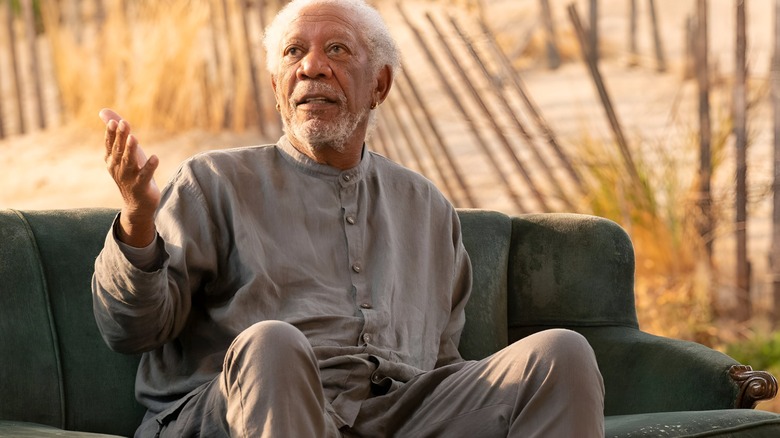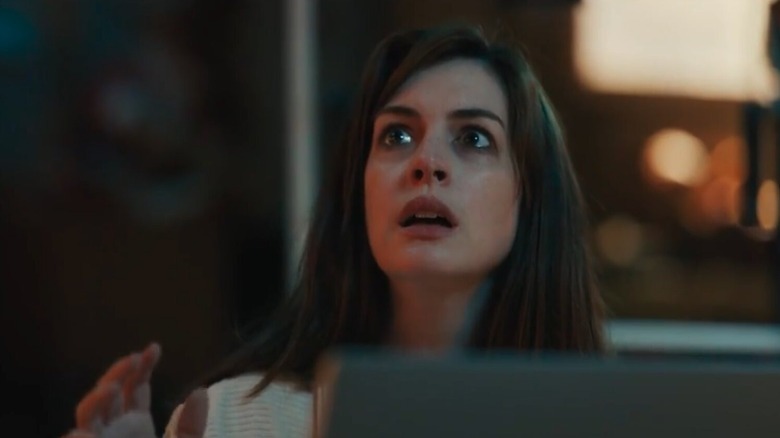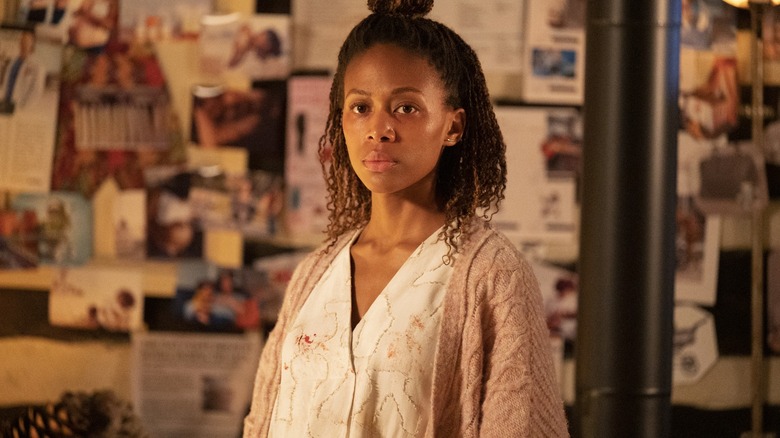Morgan Freeman's Underrated Sci-Fi Anthology Series Is Perfect For Black Mirror Fans
A sci-fi anthology series and a stacked cast might seem like a match made in heaven, as is the case with Charlie Brooker's "Black Mirror." The Netflix series has featured everyone from Peter Capaldi to Miley Cyrus, leveraging a wide range of performances that underline dystopian stories about technology and its hold over humanity. Although not every "Black Mirror" episode comes with a prescient or timely commentary about the state of the world, the series has undoubtedly set a standard for television anthologies that dabble in speculative sci-fi.
However, not every genre offering with a talented A-list cast succeeds in making a mark, as some only manage to convey an abstract sense of scope without any meaning attached to it. David Weil's "Solos" is the perfect example of such hollowness, where its critique of technology comes exclusively in the form of episodic monologues. This isn't a terrible idea on paper, as the psychological impact of living in a hyper-technological society is worth exploring on a microcosmic level. But the problem with "Solos" is that not all monologues are intriguing enough to tune into, as a performance can only be as impressive as the writing. In the end, there's a lingering feeling of the characters talking a lot, but not saying anything of note.
So, why should fans of "Black Mirror" check out "Solos?" For starters, the tonal similarity between the two shows evokes thematic overlaps that point out our complex relationship with technology. Both shows make us ponder the frightening implications of technological overreliance, which gradually invades our minds/bodies and rewrites our sense of self. Additionally, "Solos" features a few incredible episodes, including "Sasha" and "Nera", which offer some of the sharpest critiques about consumerist culture from a dystopian lens. And oh, we also have Morgan Freeman as the ever-present narrator, who appears throughout "Solos" to weave disparate stories together into one (almost) coherent tale.
A disjointed series with great performances
Spoilers for "Solos" to follow.
"Solos" presents each episodic story as a monologue, where the speaker is either alone or accompanied by at least one listener (human or non-human) onscreen. In the opening episode, "Leah," the titular scientist (Anne Hathaway) spends most of her time in isolation, as she is struggling to crack the practical application of time travel. These escalating frustrations feel more pronounced due to her mother's terminal illness, adding to her urgency to the need for a scientific breakthrough. When that does happen, Leah speaks to various versions of herself, unraveling the threads of existential dread that come with the fear of losing a loved one. Of course, Leah's plight is more complicated than this, which Hathaway conveys to visceral effect, but the overall execution feels disconnected from these intense emotions.
Although most episodes in "Solos" are as uneven as "Leah" (including one where Anthony Mackie's Tom speaks to a robot look-alike meant to replace him after his imminent death), let's talk about some of the good stuff. In "Sasha," a young woman (Uzo Aduba) has survived an apocalypse alone by living in a smart home for 20 years, but one day, her AI insists that it is safe to step outside. Sasha is terrified, launching into an almost-Shakespearean rant about how she distrusts the technology that has kept her safe for over two decades, as she believes that the AI is deceiving her. Aduba's incredible, passionate performance aside, the episode cracks upon the conundrum that comes with our over-reliance on technology, which often shapes who we are as humans. When hordes of people rely on automation systems for everyday survival, can this same instinct be relied upon when it's time to leave such clinical predictability behind?
Solos' focus on technology is filtered through existential dread and angst
"Solos" doesn't offer clear-cut answers, but it presents more ethical dilemmas, such as in "Nera," where a mother (Nicole Beharie) gives birth to a child whose accelerated aging allows the two to communicate on painfully honest terms. The two remain isolated due to terrible weather, which breeds further distrust between the frightened mother and her rapidly aging son, but they're able to find common ground in shared loneliness. This episode is more horror-adjacent than most, but portrays the conflicting sentiments prompted by someone who is not quite human, as technology has altered our biologies in irreversible ways.
There's also Freeman as Stuart, a patient in an Alzheimer's facility who narrates every episodic opening and ends up playing a much more significant role in the larger narrative. Stuart's presence in "Solos" is supposed to move us to tears, but this doesn't play out as intended, much like the series' half-hearted efforts to make us feel disconnected from our immediate realities. This is no "Devs," which manages to enthrall us with its abstractions and uses its clinical setting to raise pertinent queries. In contrast, "Solos" mostly feels devoid of sincere imagination.


